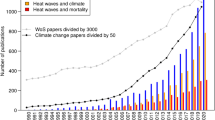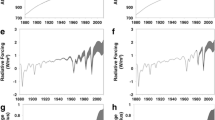Abstract
When a damaging extreme meteorological event occurs, the question often arises as to whether that event was caused by anthropogenic greenhouse gas emissions. The question is more than academic, since people affected by the event will be interested in recurring damages if they find that someone is at fault. However, since this extreme event could have occurred by chance in an unperturbed climate, we are currently unable to properly respond to this question. A solution lies in recognising the similarity with the cause-effect issue in the epidemiological field. The approach there is to consider the changes in the risk of the event occurring as attributable, as against the occurrence of the event itself. Inherent in this approach is a recognition that knowledge of the change in risk as well as the amplitude of the forcing itself are uncertain. Consequently, the fraction of the risk attributable to the external forcing is a probabilistic quantity. Here we develop and demonstrate this methodology in the context of the climate change problem.
Similar content being viewed by others
References
Allen, M.: 2003, ‘Liability for climate change’, Nature 421, 891–892.
Allen, M. R. and Stainforth, D. A.: 2002, ‘Towards objective probabilistic climate forecasting’, Nature 419, 228.
Allen, M. R. and Stott, P. A.: 2003, ‘Estimating signal amplitudes in optical fingerprinting. Part I. Theory’, Clim. Dyn. 21, 477–491.
Barsugli, J. J., Whitaker, J. S., Loughe, A. F., Sardeshmukh, P. D., and Toth, Z.: 1999, ‘The effect of the 1997/1998 El Niño on individual large-scale events’, Bull. Am. Meteorol. Soc. 80, 1399–1411.
Dessai, S. and Hulme, M.: 2003, Does Climate Policy Need Probabilities?, Technical Report, Tyndall Centre Working Paper No. 34.
Greenland, S. and Rothman, K. J.: 1998, ‘Chapter 4: Measures of effect and measures of association’, in Rothman, K. J. and Greenland, S. (eds.), Modern Epidemiology, 2nd edn., Lippincott-Raven Publishers, Philadelphia, USA, 737 pp.
Grossman, D. A.: 2003, ‘Warming up to a not-so-radical idea: Tort-based climate change litigation’, Colum. J. Envtl. L. 28, 1–61.
Institut de veille sanitaire: 2003, ‘Impact sanitaire de la vague de chaleur d’août 2003 en France. Bilan et perspectives’, 25 November, http://www.invs.sante.fr/publications/2003/bilan_chaleur_1103/.
Lorenz, E. N.: 1963, ‘Deterministic nonperiodic flow’, J. Atmos. Sci. 20, 130–141.
Mitchell, J. F. B., Karoly, D. J., Hegerl, G. C., Zwiers, F. W., Allen, M. R. and Marengo, J.: 2001, ‘Chapter 12: Detection of climate change and attribution of causes’, in Houghton, J. T., Ding, Y., Griggs, D. J., Noguer, M., van der Linden, P. J., Dai, X., Maskell, K. and Johnson, C. A. (eds.), Climate Change 2001: The Scientific Basis, Contribution of Working Group I to the Third Assessment Report of the Intergovernmental Panel on Climate Change, Cambridge University Press, Cambridge, UK, 881 pp.
Palmer, T. N.: 1999, ‘A nonlinear dynamical perspective on climate prediction’, J. Clim. 12, 575–591.
Palmer, T. N. and Räisänen, J.: 2002, ‘Quantifying the risk of extreme seasonal precipitation events in a changing climate’, Nature 415, 512–514.
Stott, P. A., Stone, D. A. and Allen, M. R.: 2004, ‘Human contribution to the European heatwave of 2003’, Nature 432, 610–614.
Author information
Authors and Affiliations
Corresponding author
Rights and permissions
About this article
Cite this article
Stone, D.A., Allen, M.R. The End-to-End Attribution Problem: From Emissions to Impacts. Climatic Change 71, 303–318 (2005). https://doi.org/10.1007/s10584-005-6778-2
Received:
Revised:
Issue Date:
DOI: https://doi.org/10.1007/s10584-005-6778-2




